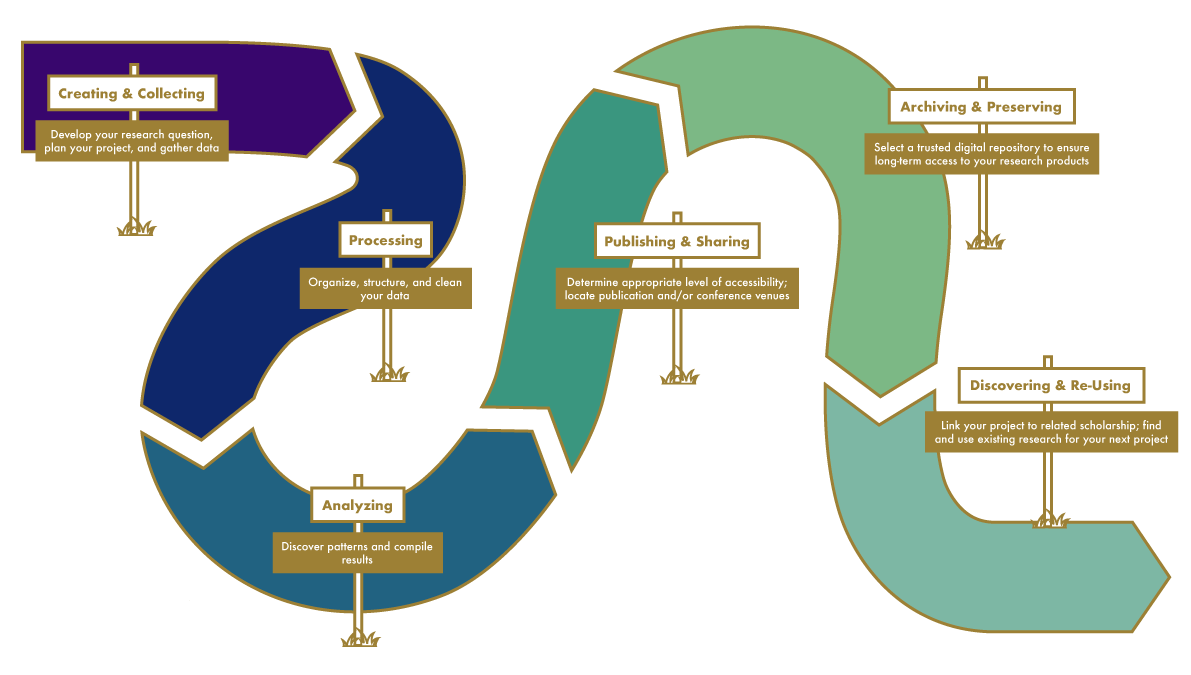Research Pathway
Digital Scholarship
 Creating & Collecting Processing Analyzing Publishing & Sharing Archiving & Preserving Discovering & Re-Using
Creating & Collecting Processing Analyzing Publishing & Sharing Archiving & Preserving Discovering & Re-UsingDownload the Digital Scholarship Research Pathway
Creating & Collecting
At the creating and collecting stage, you will establish methodology workflows and decide on data formats, file naming conventions, and metadata standards. It is important to ensure the reusability of your data by adhering to best practices in data wrangling, organization, and digital curation.
Common Tools
DISC Provides
- Database development guidance
- Metadata and data curation guidance
Processing
Data processing includes aggregating and cleaning raw data, exporting it into different formats, and structuring it so that it can be used to answer your research question.
Common Tools
DISC Provides
- Data processing workflows & best practices
- Developing codebooks and data dictionaries
- Writing and modifying scripts to expedite the cleaning process
Analyzing
Analyzing data involves exploring and interpreting what you’ve found. Examining your data to locate patterns and trends, explore themes, and identify gaps is at the core of any research project. Strategies for data analysis vary depending on the type of research project you are conducting and whether your research methods utilize qualitative or quantitative data. Digital tools for data analysis range from statistical software packages like Stata and R, to qualitative analysis tools like Nvivo and MaxQDA. These tools are designed to support sorting, coding, descriptive and inferential statistics, and data visualization. Wake Forest University provides software downloads for many of these packages.
Common Tools
- Qualitative methods
- Quantitative methods
- Text mining
- Visualization
- Mapping
DISC Provides
- Guidance in software and tool selection
- Technical assistance in creating data analysis plans
Publishing & Sharing
After creating your data, amplify its impact by making it openly accessible to other researchers. Publishing and sharing your data boosts the rate of innovation within your field by allowing other researchers to formulate new data based on your work. It is essential to ensure that your data is discoverable, obtainable, citable, and when necessary complies with funder requirements. Some items to consider when publishing your work:
- Publishing in a publicly accessible data repository
- Ensure your data is citable and includes a persistent identifier
- A license is provided showing transparency for users of your data
- A statement explaining usage rights, even if there are no requirements for reuse.
Common Tools
- Repository Directories
- Institutional Repositories
- WakeSpace Scholarship (WFU Institutional Repository)
DISC Provides
- Copyright consultation and advising
- Publishing process consultation and advising
Archiving & Preserving
It’s important to think about the long-term preservation of your research materials while you are actively engaged in the research process. Digital media are inherently fragile and are vulnerable to risks such as file format obsolescence, bit corruption, and lack of documentation. To keep your digital scholarship accessible well into the future, researchers deposit their completed work in trusted digital repositories. There are many repositories from which to choose, including Wake Forest’s digital repository, WakeSpace. DISC can assist you in identifying the appropriate repository and navigating the submission process.
Common Tools
- Data management plans
- ZSR/Wake Forest University repository
- General Repositories
- Subject-specific Repositories
DISC Provides
- Consultations and technical assistance for data management plans
- Repository identification and technical assistance
- Advice on curating and preserving your scholarship and datasets
Discovering & Re-Using
It is essential to modern research projects that they be discoverable and available for re-use by other academics. In fact, most funding sources require that associated project data be made available for public use. Learn about where and how to share your project within your designated research community. In addition, find academic communities actively sharing projects and data that may be relevant to your own research. Building a researcher profile can also be helpful in promoting your scholarship. For additional background reading about why data re-use is important, read Pasquetto et al.’s On the Reuse of Scientific Data.
Common Tools
- Re3Data
- Data One (resources for scientific data use/reuse)
- Nature.com’s Finding Data Repositories
- ORCID Researcher Profiles
DISC Provides
- Consultations and guidance for selecting a platform and/or community with which to share your research findings (articles, results, data, etc.)
- Guidance on developing your Researcher Profile
- Assistance in finding publications and data that support and enrich your own research